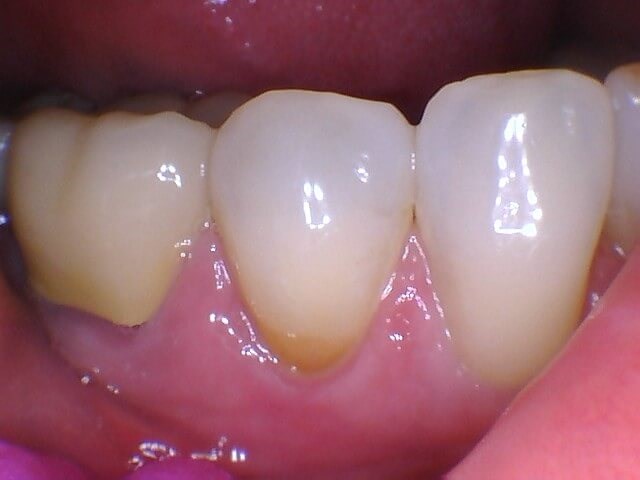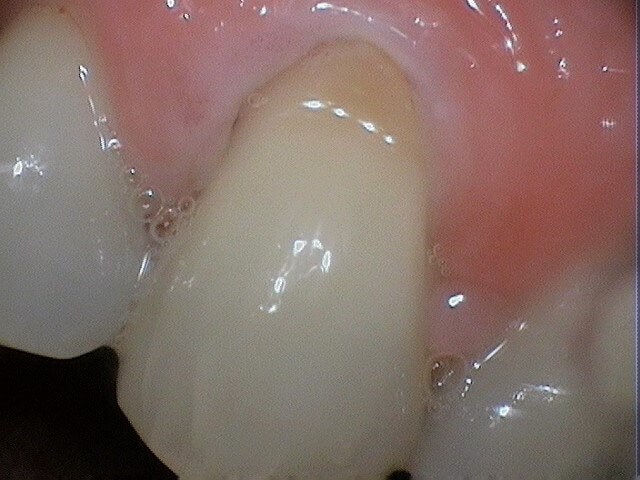Periodontal Disease
Smiles of Chevy Chase offers both nonsurgical and surgical treatment options for periodontal disease.
What Is Periodontal Disease?
Periodontal disease, also known as gum disease, is inflammation and infection of the gum tissue and bone that supports your teeth. It usually occurs because of the buildup of bacteria-laden substances known as plaque and tartar.
Plaque is a sticky substance made of bacteria and food particles that stick to your teeth and accumulate around your gums. Plaque can appear off-white or yellowish and when it’s not removed promptly with brushing and flossing it can harden into tartar, also known as calculus. Tartar can only be removed with professional dental cleanings, which is why regular dental visits are crucial for prevention.
The bacteria in these substances produce acid as waste that eats away at your teeth and gums. When left alone, these substances can accumulate below the gums, allowing bacteria to infect and further eat away at the gum tissue and the bone supporting your teeth.
Other causes of gum disease include:
- Tobacco use
- Excessive alcohol consumption
- Diabetes
- Stress
- Clenching and grinding teeth
- Genetics
- Certain medications
- Poor nutrition





Overview
Your gums are the foundation of your smile and a vital part of your oral health. When you don’t take proper care of them, they can become vulnerable to infection and inflammation, including periodontal (gum) disease. Fortunately, Smiles of Chevy Chase offers both nonsurgical and surgical treatment options for periodontal disease.
Dr. Markogiannakis can provide numerous treatments depending on the severity and specifics of your case. Keep reading to learn more about periodontal disease and the various methods through which we can treat it.

Stages of Periodontal Disease
Periodontal disease occurs in stages that become more destructive the further they advance. The stages of periodontal disease are as follows:
Gingivitis
Gingivitis is the first stage of gum disease, which may be characterized by minor tenderness and some bleeding of the gums, although you may not feel any pain or discomfort at all. Gingivitis is the only stage of gum disease where the damage caused by the infection can be not only halted but reversed with regular oral hygiene and routine dental exams with Dr. Markogiannakis.
Initial periodontitis or slight periodontitis
Initial periodontitis or slight periodontitis is the second stage, where the disease starts to attack the gum tissue and bone supporting your teeth. At this stage, the damage caused by inflammation and infection is irreversible. Alongside refining your oral hygiene routine, you’ll need professional intervention from a dentist like Dr. Markogiannakis, and will likely need to see your dentist a little more often to prevent advancement to the next stage.
Moderate periodontitis
Moderate periodontitis is very similar to initial periodontitis, the main difference is that at this stage, the bacteria can enter your bloodstream. This allows the infection to travel to other parts of your body and may serve as an explanation for the relationship between gum disease and heart disease. Professional intervention, including more frequent dental appointments and more powerful treatments, will become necessary to prevent the next stage.
Advanced periodontitis
Advanced periodontitis is the final, most aggressive stage of periodontal disease. At this stage, the infection has progressed to the point where tooth loss is almost certain. Advanced periodontitis is often characterized by severe pain, loose teeth, and pus between the gums. To save your smile, you’re likely to need surgical intervention paired with subsequent, repeated non-surgical treatments to prevent the disease from returning.
Symptoms of Periodontal Disease
One of the first steps in fighting periodontal disease is recognizing the signs. Common signs of periodontal disease include:
- Loose or separating teeth
- Bite changes
- Persistent bad breath
- Metal taste in your mouth
- Pus between gums/teeth
- Sores that don’t improve after 2 weeks
- Partial dentures or bridges not fitting correctly
- Defective fillings
- Tender or swollen gums
- Bleeding gums
- Gums that recede or pull away from your teeth

Treating Periodontal Disease
Treatment for periodontal disease will be determined by the severity of the infection. After Dr. Markogiannakis diagnoses your gum disease, she will go over her recommendations for your treatment plan. The treatment options for periodontal disease are as follows:
- Scaling and root planing (SRP) is a deep cleaning method recommended for mild cases of periodontal disease such as gingivitis. Scaling and root planing involves your dentist using handheld tools to remove excess plaque and tartar from your teeth and beneath your gums. Then, your dentist will smooth the roots of your teeth to remove pockets and prevent the future accumulation of bacteria beneath your gums.
- ARESTIN® is a locally applied antibiotic recommended for more advanced stages of periodontal disease such as initial and moderate periodontitis. It may be prescribed in addition to multiple scaling and root planing treatments.
- Gum contouring, also known as regenerative grafting and gum grafting, is often recommended for advanced periodontitis. The gum contouring process involves Dr. Markogiannakis surgically removing swollen and infected gum tissue to even out your gum line and help prevent the spread of infection.
- Pocket reduction is another surgical option for advanced cases, similar to root planing and scaling. Your dentist will pull your gums away from the roots and bones before removing bacterial buildup and diseased gum tissue. The bones and roots will be smoothed and reshaped to help prevent bacteria from accumulating there in the future. Dr. Markogiannkis will then suture your gums back onto the bone in a way that reduces pocket depth.
Smiles of Chevy Chase For Periodontal Disease Treatment
Periodontal disease can get worse the longer it goes untreated, but with professional advice and care from Dr. Markogiannakis, your smile can be beautiful and strong again. If you think you’re experiencing symptoms of gum disease, contact Smiles of Chevy Chase by dialing 301-652-0656 to learn more about our periodontal disease treatments. You can also fill out the contact form in the upper-right-hand corner of the page, and we’ll get back to you soon.
Dr. Markogiannakis, a top dentist in the Greater Washington area, and the rest of the team at Smiles of Chevy Chase are accepting new and returning patients from Chevy Chase. We also proudly offer treatment for periodontal disease to patients from surrounding areas such as Bethesda, Somerset, and Forest Hills, MD.

Frequently Asked Questions
Can I reverse my periodontal disease at home?
The earliest stage of periodontal disease, gingivitis, can often be reversed by simply refining your oral hygiene routine. However, the best way to treat periodontal disease is by consulting with a professional. Even with the most diligent at-home routine, there are parts of your teeth that are hard to clean properly. Without consulting a professional before attempting to treat gum disease yourself, it may result in your gum disease recurring later on or not fully clearing up, allowing it to advance or return.
If you want to control your symptoms until you can see a dentist, Dr. Markogiannakis recommends the following:
- Brush at least twice a day for at least two minutes
- Floss at least once a day, especially before bedtime
- Rinse with mouthwash between meals
- Stay hydrated
- Reduce your sugar intake
- Stop using tobacco
- Limit or cease alcohol consumption
- Exercise regularly to boost your immune system
How long does it take to recover from periodontal disease?
The time it takes to recover from gum disease will vary depending on multiple factors. Dr. Markogiannkis may recommend multiple appointments at Smiles of Chevy Chase to fully treat your gum disease.
Once your oral health has been restored, you should continue attending routine dental examinations and cleanings at our Chevy Chase office. Your dentist may also recommend the use of antibacterial toothpaste and mouthwash to ensure your periodontal disease doesn’t return.
How much does periodontal disease treatment cost?
The exact cost of your periodontal disease treatment will vary based on multiple factors including the severity of your case, the treatment you need, and your insurance coverage. Most insurance plans should cover at least part of your periodontal disease treatment. Our office will contact your insurance company to determine what they cover and if there will be any additional costs.
For patients without insurance, Smiles of Chevy Chase accepts many payment methods, and we can help you find low-interest medical financing. If you have any concerns about costs, please talk to Dr. Markogiannakis during your consultation.
Is periodontal disease life-threatening?
Periodontal disease is rarely life-threatening on its own. However, more severe stages of periodontal disease can spread bacteria to other parts of your body, such as your heart. Additionally, letting gum disease go unchecked can ruin your oral health and make you much more susceptible to overall health complications. If you suspect you’re experiencing possible symptoms of periodontal disease, contact our Chevy Chase office by dialing 301-652-0656.
